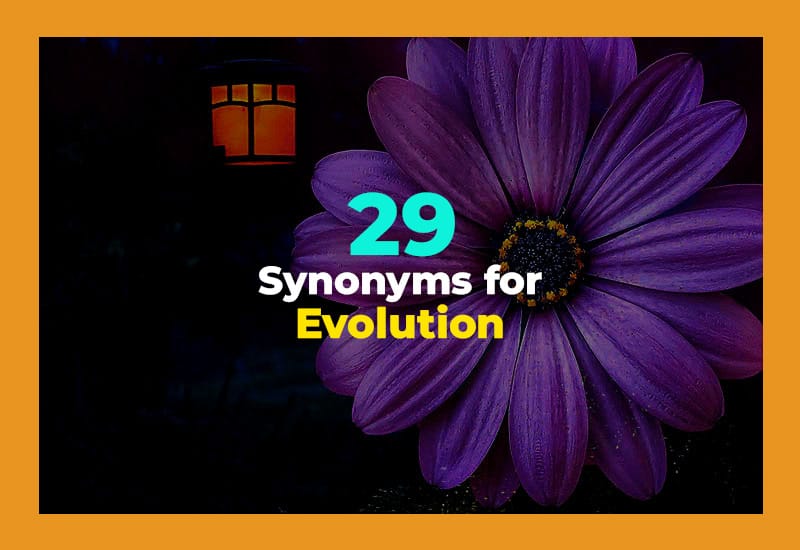Change is a natural part of life, right? Whether it’s your style growing over time or technology getting smarter, things keep moving forward. But instead of always saying "evolution," why not switch it up? There are so many cool and simple words like growth, transformation, or upgrade that help describe how things improve or shift. Today, we're diving into some of the most helpful and easy-to-understand synonyms for evolution.
1. Progress
Progress means moving forward or getting better over time. It's when you take steps in the right direction toward improvement. This word can be used in so many ways, from school to technology to personal goals. "He made great progress in learning how to play the guitar." Progress doesn't have to be fast, but it does mean you're heading somewhere better than where you started. It's a friendly word that shows you're on the right track. Whether you're building a business or working out more, progress is all about growing step by step.
2. Development
Development is all about the process of growing or becoming more advanced. You'll hear this word used for skills, technology, cities, and even ideas. "The town saw a lot of development after the new school opened." It suggests slow and steady improvement. Development can be physical, like buildings going up, or personal, like improving your talents. It's a flexible word and works well in both everyday talk and serious discussions. Whether it's a child learning new words or a business launching new features, development is always about moving ahead.
3. Growth
Growth is one of the most common and simple ways to describe evolution. It means getting bigger, better, or stronger. "Her confidence showed real growth over the year." Growth can be physical, like a plant growing taller, or emotional, like becoming more mature. This word is super positive and is often used in personal, academic, or business settings. If something is growing, it's improving or expanding. Everyone can relate to growth because we've all gone through it. It's one of those words that feels natural and encouraging.
4. Advancement
Advancement means moving forward, especially in skills, jobs, or technology. It's a formal way to talk about progress, often used in work or education. "She received a promotion because of her career advancement." It shows that someone or something is not stuck—they're going up to the next level. You might hear it when talking about medicine, science, or personal improvement. Advancement feels like a step up from where you were before. It's great for showing a clear change from good to better.
5. Transformation
Transformation means a big change, usually for the better. It often describes something turning into something else entirely. "The room went through a total transformation after the renovation." This word can be used for people, places, and ideas. Transformation has a powerful feel to it—it's not just a small change, but a full shift. Whether it's a makeover show or a personal journey, this word shows serious improvement. It's perfect for when something or someone ends up looking or acting very different than they did before.
6. Change
Change is one of the simplest and most flexible words out there. It just means something is different than before. "There was a big change in her attitude after the trip." Change can be good or bad, big or small. It's used everywhere—from conversations with friends to world news. You can change your clothes, change your mind, or change the world. This word is easy to understand and works in almost any situation where something doesn't stay the same.
7. Metamorphosis
Metamorphosis is a big word with a magical feel. It means a complete change in form, usually in animals or people. "The caterpillar's metamorphosis into a butterfly was amazing to watch." It's not just a small shift—it's a full transformation. While it's often used in nature, people also use it to describe personal change. This word adds drama and excitement. If you want to describe a change that's both powerful and beautiful, metamorphosis is a great pick.
8. Adaptation
Adaptation means getting used to something new or changing to fit a new situation. "The animal's thick fur is an adaptation to cold climates." It's all about adjusting and surviving. People adapt, animals adapt, and even technology adapts. This word is useful when talking about change that happens for a reason. Adaptation shows flexibility and smart improvement. If something changes to better match its environment, that's adaptation in action. It's perfect for describing both slow changes and smart reactions.
9. Modification
Modification means a small change made to improve something or make it work better. "He made a modification to the car so it would go faster." This word suggests that you didn't throw out the old—you just changed it a little. It's often used with machines, tools, or plans. It's a helpful way to talk about updates or improvements. If you want to say that something got tweaked to be more useful, "modification" is your word.
10. Improvement
Improvement means making something better than it was before. "There was a huge improvement in her grades this semester." It can be used for anything—your cooking skills, your health, or even your house. It's a positive word that people love to hear. Everyone wants to see improvement, and this word makes it clear that something is going in the right direction. It's simple, cheerful, and works in almost any situation where something has gotten better.
11. Maturation
Maturation means the process of becoming more mature or fully developed. "His emotional maturation took time, but it made him a better leader." It's a fancy word for growing up, whether it’s a person, a business, or an idea. This word is often used in biology or psychology, but it also fits in everyday life. It shows slow, steady, and thoughtful change. Maturation is more than just getting older—it's about becoming wiser and more complete.
12. Progression
Progression means a series of steps or changes that lead forward. "The story showed the hero's progression from shy kid to brave leader." It's a smooth, steady kind of movement that brings improvement. You can talk about a progression in learning, in health, or in career goals. It's a great word when you want to show how something is unfolding over time. It fits both personal and professional situations, making it a flexible and helpful synonym.
13. Expansion
Expansion means getting bigger or spreading out. "The company's expansion into new countries boosted sales." It's used when talking about businesses, cities, or even ideas. It suggests growth that reaches wider and touches more areas. Expansion is a great word for describing success and forward movement. It gives the feeling that things are going well and growing bigger. If you want to describe growth that stretches outward, expansion is the perfect word.
14. Revolution
Revolution means a sudden, big change—usually one that turns everything around. "The internet started a revolution in how we communicate." It can describe political change, technology, or even a new way of thinking. It's a powerful word that shows that nothing will be the same again. Revolution isn't just about change—it's about starting fresh. It's dramatic, bold, and exciting. If you want to talk about a major shake-up, this is the word to use.
15. Upgrade
Upgrade means improving something by replacing it with something newer or better. "I got a phone upgrade with a better camera." It's a modern word, often used in tech or travel. Upgrade suggests that what you had was fine, but now you've got something even better. It's all about leveling up. This word feels casual and friendly, and it's perfect when you want to show that you've moved forward in a good way.
16. Innovation
Innovation means creating something new or finding a better way to do something. "The new app is a true innovation in online shopping." It's often used in science, tech, and business. Innovation isn't just about change—it's about smart, creative improvement. It makes life easier, faster, or more fun. This word is full of energy and ideas. If something feels fresh and useful, it's probably an innovation.
17. Conversion
Conversion means changing something into something else, often in form or purpose. "They did a conversion of the old barn into a cozy café." It can be physical, like buildings or cars, or personal, like beliefs. It's a smooth word that shows a clear shift from one thing to another. Conversion is great when the change is big and clear but still keeps some connection to the original.
18. Reform
Reform means making changes to improve something, usually systems or rules. "The government announced a new reform in education policy." It's serious and often used in politics, law, or business. Reform shows that things aren't just changing—they're being fixed. It's a word full of hope and purpose. If something needs to be better and fairer, reform is the word that helps express that.
19. Transition
Transition means moving from one state or condition to another. "The transition from school to work can be challenging." It's about the process in between—where you're not where you started, but not quite where you're going either. It's a smooth, calm word that shows gentle movement. Transition can describe life changes, seasons, or even feelings. It's helpful when you want to show slow but sure change.
20. Emergence
Emergence means coming into view or becoming known. "The emergence of electric cars is changing the auto industry." It's often used for new ideas, trends, or technologies. Emergence shows that something new is arriving and starting to make a difference. It's a hopeful word, showing that something exciting or useful is just beginning. Use it when you want to describe a fresh start or rising idea.
21. Shift
Shift means a small or big move in position, thinking, or feeling. "There was a shift in public opinion after the speech." It's a light, easy word that can describe change without making it sound too big. Shift is useful for describing changes in mood, habits, or direction. It's flexible and can be used in both casual and serious conversations. It helps explain change in a clear and simple way.
22. Alteration
Alteration means a small but noticeable change. "She made an alteration to her dress before the wedding." It's used for adjustments that improve something or make it fit better. You might hear it in fashion, design, or even plans. Alteration isn't a full transformation—it's more like a helpful tweak. It's a calm, useful word that describes simple but effective changes.
23. Renewal
Renewal means making something fresh, new, or strong again. "The spa visit gave her a sense of renewal and peace." It can describe personal feelings, documents, or nature. Renewal has a peaceful, hopeful vibe. It's about bringing something back to life, not just changing it. It's great for situations where something is being refreshed or given new energy.
24. Adjustment
Adjustment means a small change to make something better or more suitable. "He made an adjustment to the chair to sit more comfortably." It's simple and friendly. Adjustment doesn't mean starting over—it means fixing or fine-tuning what's already there. This word is perfect for describing everyday changes and personal growth.
25. Diversification
Diversification means adding variety or trying new things. "The company's diversification into new markets helped it grow." It shows smart change that includes more options or choices. It's often used in business and investing. Diversification makes things stronger and safer by not depending on just one thing. It's great for describing thoughtful evolution.
26. Refinement
Refinement means making small improvements to make something more polished or perfect. "The software update brought several refinements to its design." It's a smooth word that feels classy. Refinement isn't about big change—it's about making good things even better. Use this word when something is already great but just needs a bit of fine-tuning.
27. Restructuring
Restructuring means changing the way something is organized. "The company went through restructuring to save money." It's often used in business, but it can describe personal routines too. Restructuring shows serious, thoughtful change to make things work better. It's about taking apart what's there and putting it back in a smarter way.
28. Mutation
Mutation means a change in form or structure, often used in science or biology. "The virus had a mutation that made it spread faster." It's a word that shows sudden, sometimes random change. Mutation can be good or bad, but it always means something different has appeared. It's great for describing unexpected evolution.
29. Upscaling
Upscaling means making something bigger or better, often for more people or wider use. "The startup is upscaling its services to reach more users." It's common in tech and business. Upscaling shows smart growth and bold steps forward. It's about thinking bigger and doing more. If something is getting more advanced and reaching more people, it's being upscaled.

Final Thoughts
Whether you’re talking about personal growth, business progress, or how the world keeps changing, having different ways to say "evolution" makes everything more fun and interesting. Each synonym tells a slightly different story—some small and gentle, some big and bold. Try using these words in your own life and writing to explain the awesome ways things keep changing for the better. Remember, everything evolves, including your vocabulary!









